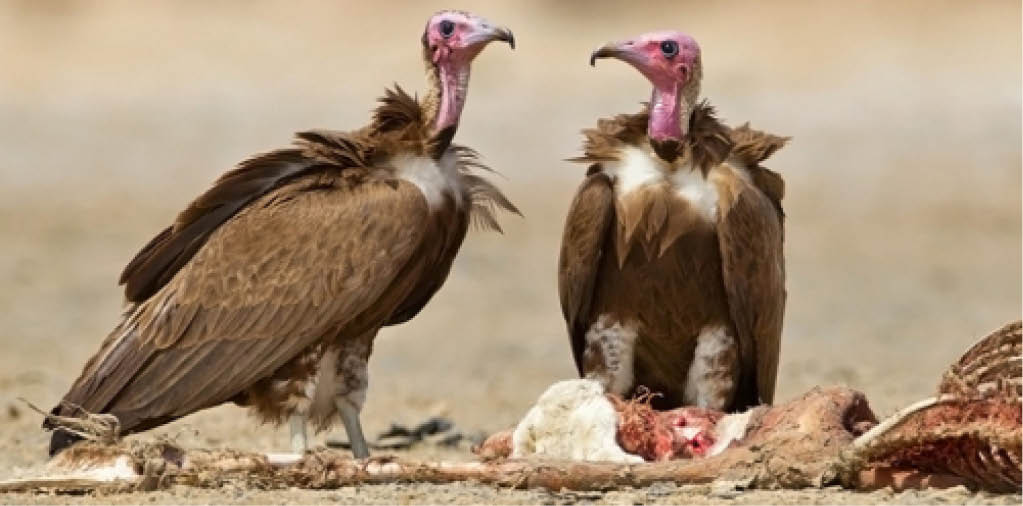- …Ibadan, Kano major trade routes – Report
In recent times, vultures have almost or completely disappeared from the environment. In the past, vultures were seen around neighbourhoods, especially places like abattoir or dumpsites.
Report has it that globally, the population of vultures has suffered a serious decline with some species recording about 95 percent decline. This decline has been blamed on various factors including direct persecution, poisoning, death from diclofenac biomagnification, use of vulture parts for traditional medicines, among others.
Africa is home to about 11 species of vultures. The continent has also suffered the decline of the bird; it has been shown that six out of the 11 species of vulture in Africa are on the brink of extinction. The conservation of vulture species in Nigeria and Africa must be a priority for all because of their importance in the ecosystem.
In Nigeria, the vulture population has witnessed marked decline both in protected and unprotected areas. Protected areas that are supposed to be haven for these species have also witnessed this disturbing trend. According to BirdLife, a global conservation organisation, this decline has tremendous impact on human health and the economy.
A study conducted on Yankari Game Reserve in 2013 showed that more than 95 per cent of vulture population declined due to use for traditional medicine.
Survey carried out further showed that poisoning in abattoirs for onward sale in the wildlife market, extraction of eggs from nests, habitat degradation from indiscriminate logging thereby reducing nest sites for vultures and poor perception of vultures as harbinger of ill-will have all led to this decline.
Meanwhile, the Nigerian Conservation Foundation (NCF), in an effort to reverse the trend in Nigeria, carried out a survey where they involved stakeholders within the wildlife trade value-chain in the country to understand some of the most critical issues around the socio-economic value chain driving illegal wildlife trade in Nigeria with belief-base use (traditional medicine) as chief driver.
A report of the survey obtained by Daily Trust showed that NCF visited 17 wildlife markets across Ogun, Osun, and Ondo States in southwest Nigeria, and engaged over 3,000 stakeholders (actors and non-actors) across state government ministries, traditional healers, tertiary institutions; media, and the general public.
The report which was tagged “Vanguards Conservation of Vulture Species in Africa” was released this month, signed by the NCF Head of Communications, Oladapo Soneye. It said many of the stakeholders do not have historical knowledge about the African vulture crisis.
He said the stakeholders’ awareness rate of the health and economic role and importance of vulture is significantly low; put at 5-7% as majority find vulture species as fearful, dangerous, and not good to be associated with, let alone having to recognise the role the species plays in the society.
The market assessment reveals that vulture parts have local and international trade route with major hubs in Ibadan and Kano (in Nigeria), Cameroon, Niger Republic, and Burkina Faso.
Acccording to the report, a life vulture is worth US$85-140 while a dead vulture is worth US$40-60 depending on location and availability. The demand for African vulture and its parts is very high which is largely driven by belief-base use.
The report also showed that Interborder agencies and other law enforcement agencies also lack the knowledge required to combat vulture trade and largely wildlife crime in Nigeria.
With the report that in the sub Saharan region, Nigeria is a hotspot for exporting of illegally sourced wildlife products, NCF and its International Partner – BirdLife African Secretariat have moved to combat illegal trade in vultures and other species of wildlife.
The NCF project created some level of conscionable action among the targeted stakeholders and the public through 15 dialogue sessions in radio and television programmes and newspaper publications.
The main goal of the project is to reduce by 20 per cent the illegal trade of vulture parts by 2021 in wildlife markets in Nigeria through strengthened law enforcement and identification of alternative tradable products.
This, according to Soneye, will be done through the improvement of capacity of Special Criminal Investigation Agencies to monitor, investigate and prosecute illegal wildlife trade related crimes; implementation of the African-Eurasian Multi-species Action Plan (Vulture MsAP) and the African Common Strategy on Illegal Wildlife Trade in Nigeria; and to enhance public awareness at the national and regional level on the social, economic and ecological impacts of the illegal trade in birds and wildlife.
Further market surveys were conducted in 11 wildlife markets across the targeted three Nigerian states -Kano, Ogun, and Oyo where it was reported that vultures are now sourced from Cameroun, Burkina Faso, Chad and Benin Republic, Jigawa State, Yobe State, River State, Enugu State, Taraba State etc.

 Join Daily Trust WhatsApp Community For Quick Access To News and Happenings Around You.
Join Daily Trust WhatsApp Community For Quick Access To News and Happenings Around You.


